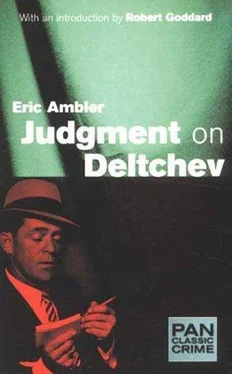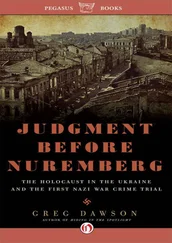Eric Ambler - Judgment on Deltchev
Здесь есть возможность читать онлайн «Eric Ambler - Judgment on Deltchev» весь текст электронной книги совершенно бесплатно (целиком полную версию без сокращений). В некоторых случаях можно слушать аудио, скачать через торрент в формате fb2 и присутствует краткое содержание. Год выпуска: 1977, ISBN: 1977, Издательство: Vintage, Жанр: Криминальный детектив, на английском языке. Описание произведения, (предисловие) а так же отзывы посетителей доступны на портале библиотеки ЛибКат.
- Название:Judgment on Deltchev
- Автор:
- Издательство:Vintage
- Жанр:
- Год:1977
- ISBN:9780307049971
- Рейтинг книги:4 / 5. Голосов: 1
-
Избранное:Добавить в избранное
- Отзывы:
-
Ваша оценка:
- 80
- 1
- 2
- 3
- 4
- 5
Judgment on Deltchev: краткое содержание, описание и аннотация
Предлагаем к чтению аннотацию, описание, краткое содержание или предисловие (зависит от того, что написал сам автор книги «Judgment on Deltchev»). Если вы не нашли необходимую информацию о книге — напишите в комментариях, мы постараемся отыскать её.
Judgment on Deltchev — читать онлайн бесплатно полную книгу (весь текст) целиком
Ниже представлен текст книги, разбитый по страницам. Система сохранения места последней прочитанной страницы, позволяет с удобством читать онлайн бесплатно книгу «Judgment on Deltchev», без необходимости каждый раз заново искать на чём Вы остановились. Поставьте закладку, и сможете в любой момент перейти на страницу, на которой закончили чтение.
Интервал:
Закладка:
I got up and began to wander round the room. I knew now that the train of thought I had been avoiding could be avoided no longer.
If you accepted the seemingly incredible proposition that Deltchev was, and for years had been, a member of the Officer Corps Brotherhood, it was possible to explain some things about him that had hitherto defied explanation. To begin with, you could explain the inexplicable election affair; Deltchev had done what he did, not because he had thought it right or necessary, or because he was a saint, or because he had been bought; he had done it in obedience to the orders of the Brotherhood. And having said that, you could also explain why he had been able to give no explanation himself for his action. You could explain, though with difficulty, how a prosaic, undistinguished Minister of Posts and Telegraphs had been able to become the leader of a secret nationalistic revolutionary movement and ultimately seize power. You could explain the ‘football match’ incident in that context; the fanatically nationalistic Brotherhood, having, through fear of the growing People’s Party, misjudged the election timing, had commanded their puppet Deltchev to retrieve the position. Napoleon the Third had done more for the Carbonari. Besides, had not Petlarov himself admitted that power was a bribe that might be used with Deltchev? In a fantastic way it all fitted. It might be objected that, as a lawyer, Deltchev would not have qualified for membership in the early days of the Brotherhood; but the class distinction between professional men and army officers was not great. His membership was not impossible. It was certainly not improbable. Idealistic young men very often joined societies supposedly dedicated to the human struggles for freedom and justice; and very often, too, they later regretted having done so. When, I wondered, had Deltchev begun to regret the association? Then another objection occurred to me. Why, if the Brotherhood had supported Deltchev, had it also collaborated with the German occupation forces? But this I disposed of easily. What better cover could there have been for the subversive activities of the Brotherhood than half-hearted collaboration with the German Army? Not with the sharp and sceptical Gestapo, mark you, but with the army. It would be interesting to know about the men who had made the Brotherhood’s policy. Perhaps the trial would reveal them.
But meanwhile Deltchev’s daughter had sent a letter to a cheap lodging where there was a murdered man. I thought about that. Who was Valmo? Katerina’s middle-aged lover? I doubted it. This rather too knowing young woman had offered me a drink because she had thought that the engaging way with an irritable reporter; she had said that the letter was to ‘a young man’ because she had thought, perhaps less incorrectly, that that was the engaging way with a reluctant letter-smuggler. If I had had the presence of mind to do so, I might have looked more closely at the room for signs of a relationship with Katerina; her photograph perhaps, or a letter in her handwriting. A letter. And that brought me back to Pashik.
I had made a mistake about Pashik. I had thought of him as one of those hapless, over-anxious persons who cannot help entangling themselves in systems of small, unnecessary lies. It had not occurred to me that he might have anything of more than private importance to conceal. Now I had to reckon with the news that not only could he be concerned quite calmly with the body of a murdered man but also that his tiresome preoccupation with ‘discretion’ had its origins in something very unlike the old-maidish timidity to which I had attributed it.
At that moment, with a jolt, I came out of the haze of cowlike rumination in which I had been lost and began to think clearly. If Pashik had known that the body was there before he came to the house, why was it necessary to consult his ‘friend in the special police’ so urgently? Answer: because I had been there, because I had seen the body, because I had seen Pashik, because I had drawn certain conclusions, because I might be indiscreet.
I had been pacing up and down the room. I stopped, then went to the door. From another part of the apartment there came very faintly a murmur of voices. I glanced at my watch. Pashik had been gone five minutes. I was suddenly convinced that it would be wise to leave without waiting to be introduced to Pashik’s friend — to leave now, quietly. I hesitated momentarily, then I made up my mind. I put my hand on the doorknob and turned it gently. Then I began to pull. But the door did not move. I had been locked in.
CHAPTER ELEVEN
For a moment or two I stood there looking stupidly at the door as if I expected it to open itself. To find oneself locked in a room and know that the locking cannot be accidental or a practical joke is an extraordinary sensation. My feelings were confused and are not easily described; I was angry and frightened and depressed all at once. Then I broke out into a sweat. I tried the door again, then turned away from it. The room suddenly looked different, very large and empty, and I could see every detail in it. There was something familiar and yet not quite right about it.
When I had been walking about I had noticed an inch or two of string looped round one corner of the carpet. Now I saw it again; I was standing on the hardwood surround just by it. At that moment I was wondering if I should hammer on the door and demand to be let out, or sit there quietly and pretend not to have noticed that I had been locked in. Absently I reached down to pick up the string. I wanted something to fidget with. I got the string, but the corner of the carpet came up with it. The string was threaded through the edge of the carpet and tied to a label. The label had some figures written on it and a printed name, obviously that of the dealer who had sold it. It was an expensive carpet, a Sparta, yet the owner had not troubled to remove the price tag. It had simply been tucked away out of sight. I was puzzled. I let the carpet fall back into place and walked round the room again. At one end by the windows there was a buhl cabinet. I opened one of the drawers. There was a small brass screw in it and some dust. I tried the other drawers. All were empty except one, which contained a price tag from the same dealer who had supplied the carpet. I went round quickly looking at the wood of the chairs. They had been used a lot and yet there was a certain un used look about them. And then I knew what was familiar about the room: it was like a stage set when all the furniture has just been brought in and placed in position.
At that moment I heard voices and footsteps in the passage outside. I sat down. They came to the door and there was a slight pause. I knew why. The person who was about to open the door was preparing to turn the knob and the key simultaneously so that the sound of the latch would conceal that of the unlocking. If I did not know that I had been locked in, they did not want to tell me of the fact. My heart beat faster.
The door opened and after a momentary pause Pashik came in. He was followed slowly by a small man in a loose tussore-silk suit and a black tie. I stood up.
Pashik put his hand on my shoulder and enveloped me in a broad smile. ‘Herr Foster,’ he said in German, ‘let me introduce you to Herr Valmo.’
I had no time to digest this surprise. The other man came forward with a polite smile and held his hand out tentatively.
‘So pleased, Herr Foster,’ he said.
He was about fifty, short and very slight, with wispy and receding grey hair brushed back from a sunburnt forehead. It was a thin, pointed face with large, pale blue eyes and an expression that might have been cruel or amused or both. He looked like a retired ballet dancer who has taken successfully to management. In his hand was Katerina Deltchev’s letter. It had been opened.
Читать дальшеИнтервал:
Закладка:
Похожие книги на «Judgment on Deltchev»
Представляем Вашему вниманию похожие книги на «Judgment on Deltchev» списком для выбора. Мы отобрали схожую по названию и смыслу литературу в надежде предоставить читателям больше вариантов отыскать новые, интересные, ещё непрочитанные произведения.
Обсуждение, отзывы о книге «Judgment on Deltchev» и просто собственные мнения читателей. Оставьте ваши комментарии, напишите, что Вы думаете о произведении, его смысле или главных героях. Укажите что конкретно понравилось, а что нет, и почему Вы так считаете.












